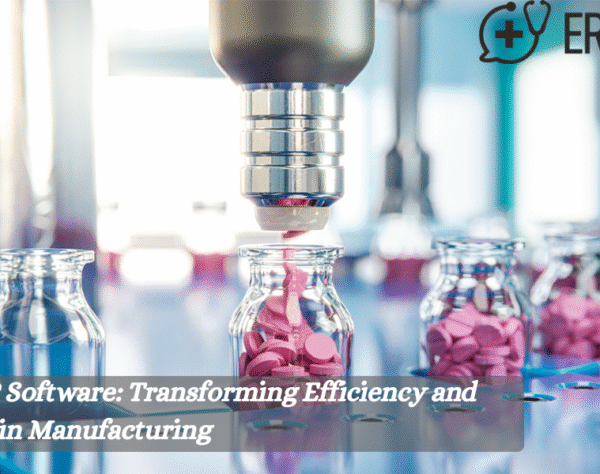
Why ERP is Backbone of Bangalore Thriving Pharma Industry

ERP Advantage: How Bangalore Pharma Industry Stays Ahead
Bangalore, known as the Silicon Valley of India, has witnessed exponential growth in its pharmaceutical industry. With stringent regulatory requirements, rising demand for high-quality medicines, and the need for streamlined operations, Bangalore pharma industry are rapidly adopting Enterprise Resource Planning (ERP) solutions. ERP serves as the backbone of this thriving sector, enabling businesses to achieve operational efficiency, regulatory compliance, and data-driven decision-making. This blog explores the critical role of ERP in Bangalore pharmaceutical industry, highlighting its benefits, challenges, and future potential.
Growing Need for ERP in Bangalore Pharma Industry
Regulatory Compliance & Audit Readiness
The pharmaceutical sector operates under strict regulations set by organizations like CDSCO, US FDA, and WHO-GMP. Non-compliance can result in heavy penalties, legal issues, and even business shutdowns. ERP solutions help pharma companies adhere to these standards by automating documentation, tracking batch records, and ensuring data integrity.
Improving Production Efficiency
Pharmaceutical production involves complex processes, including material procurement, batch processing, quality control, and packaging. ERP streamlines these processes by integrating all production-related data into a single system, reducing manual errors and optimizing resource utilization.
Inventory Management & Material Traceability
Maintaining optimal stock levels is a challenge in the pharmaceutical industry. Excess inventory leads to financial losses, while stock shortages can disrupt production. ERP provides real-time inventory tracking, reducing waste and ensuring efficient stock management. Moreover, it enables complete traceability of raw materials, reducing the risk of counterfeit drugs.
Enhancing Supply Chain & Distribution
An ERP system optimizes the supply chain by automating demand forecasting, procurement, and supplier management. Bangalore pharma companies benefit from real-time tracking of shipments, automated order processing, and reduced lead times, ensuring timely delivery to customers and distributors.
Quality Control & Compliance Management
Pharma companies must ensure that every batch meets strict quality standards. ERP solutions integrate Quality Management Systems (QMS) to monitor deviations, track product recalls, and document corrective actions, ensuring adherence to Good Manufacturing Practices (GMP).
Data-Driven Decision Making
An ERP system centralizes data from various departments, providing pharma businesses with real-time insights into production, sales, financials, and compliance. Decision-makers can use data analytics and reporting tools to identify inefficiencies, forecast trends, and make strategic decisions.
Automating Financial & Accounting Processes
Handling financial transactions, vendor payments, tax calculations, and budgeting manually is inefficient and prone to errors. ERP automates financial workflows, GST compliance, cost tracking, and profit analysis, ensuring financial transparency.
Ensuring Data Security & Cyber Compliance
With increasing cyber threats and data breaches, pharmaceutical companies must ensure robust data security. ERP solutions come with advanced encryption, user access controls, and backup features, ensuring that sensitive data remains protected.
Challenges in Implementing ERP
Despite its numerous advantages, ERP implementation in pharma companies comes with certain challenges:
- High Initial Costs – ERP systems require significant investment in software, training, and infrastructure.
- Customization Needs – Pharma businesses have unique operational needs that require tailored ERP solutions.
- Employee Resistance – Adopting ERP involves a learning curve for employees who are used to traditional methods.
- Regulatory Compliance Updates – Constantly evolving regulatory requirements demand continuous ERP system updates.
Future of ERP in Bangalore Pharma Industry
With advancements in AI, cloud computing, and IoT, the future of ERP in the pharmaceutical industry looks promising. Companies are shifting towards cloud-based ERP solutions that offer scalability, real-time accessibility, and cost-effectiveness. Additionally, AI-driven analytics and blockchain-based traceability are enhancing the industry’s compliance and operational efficiency.
FAQs on ERP in Pharmaceutical Industry
1. How does ERP improve compliance in the pharmaceutical industry?
ERP automates documentation, ensures batch traceability, and integrates compliance modules to adhere to regulatory requirements like GMP, FDA, and CDSCO standards.
2. Which is the best ERP software for pharmaceutical companies in Bangalore?
Popular ERP solutions include SAP Business One, Microsoft Dynamics 365, Oracle NetSuite, SAP S4 HANA, and Sage X3, all designed specifically for the pharma industry.
3. How does ERP help in pharma inventory management?
ERP provides real-time inventory tracking, expiry date management, stock optimization, and automated alerts for reordering raw materials, preventing overstocking or shortages.
4. Can ERP help in tracking product recalls?
Yes, ERP enables complete batch traceability, allowing manufacturers to quickly identify, isolate, and recall defective or contaminated products.
5. Is cloud-based ERP better for pharma companies than on-premise ERP?
Cloud-based ERP offers advantages like scalability, lower upfront costs, remote accessibility, and automatic updates, making it a preferred choice for growing pharmaceutical firms.
6. How long does it take to implement ERP in a pharmaceutical company?
ERP implementation typically takes 6 months to 2 years, depending on company size, customization requirements, and training needs.
7. Does ERP improve pharma supply chain management?
Yes, ERP optimizes procurement, vendor management, shipment tracking, and demand forecasting, ensuring a seamless end-to-end supply chain.
8. How does ERP assist in pharma quality control?
ERP integrates Quality Management Systems (QMS) to monitor deviations, automate inspections, and ensure every product batch meets regulatory standards.
9. What are the cost factors involved in ERP implementation for pharma companies?
Costs include software licensing, infrastructure setup, employee training, system customization, and ongoing maintenance.
10. How can small and mid-sized pharma companies in Bangalore afford ERP solutions?
Many affordable ERP solutions cater to small and mid-sized businesses, including cloud-based and subscription-based ERP models that reduce upfront investment.
Pharma ERP Edge
ERP is undeniably the backbone of Bangalore pharmaceutical industry, providing streamlined operations, regulatory compliance, and a competitive edge. As technology continues to evolve, pharma companies that adopt AI-driven and cloud-based ERP solutions will gain long-term efficiency and success. Investing in ERP is no longer an option but a necessity to stay ahead in this highly regulated and competitive market.
Are you ready to transform your pharmaceutical business in Bangalore with an ERP solution? Get started today!
Looking for expert guidance? Complete the form below, and we’ll get in touch with you shortly!







